Internet addiction and academic performance: relationship, impact and overcoming problems
Table of content
- What is the relationship between internet addiction and academic performance?
- What are the impacts of internet addiction on academic performance?
- How common is internet addiction in students?
- What are the causes of student internet addiction?
- How do you overcome internet addiction to improve academic performance?
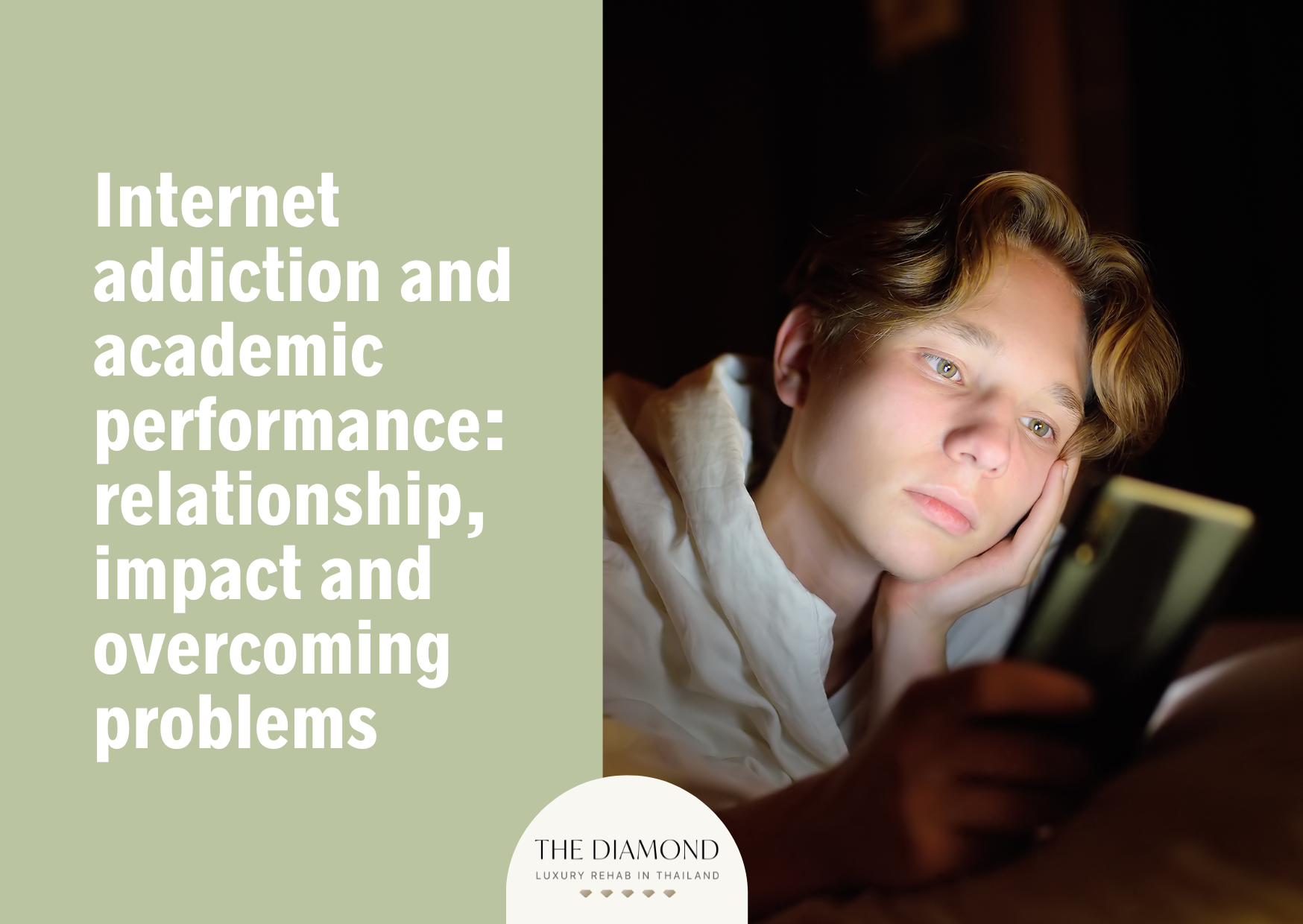
The relationship between internet addiction and academic performance entails a decrease in concentration on schoolwork and a reduction in study time, with both factors frequently resulting in worse grades.
The impacts of internet addiction on academic performance are classified as either short-term or long-term. The short-term impacts of internet addiction on academic performance include decreased focus, delayed task completion, reduced class participation, burnout and impaired short-term memory.
The long-term impacts of internet addiction on academic performance are decline in academic achievement, chronic poor time management, erosion of critical thinking skills, persistent low motivation and social and academic isolation.
Overcoming problems related to internet addiction for the purpose of improving academic performance usually require the internet-addicted student to acknowledge the problem, set study priorities, create a structured schedule, practice mindfulness, engage in offline hobbies, identify triggers and consider professional help.
What is the relationship between internet addiction and academic performance?
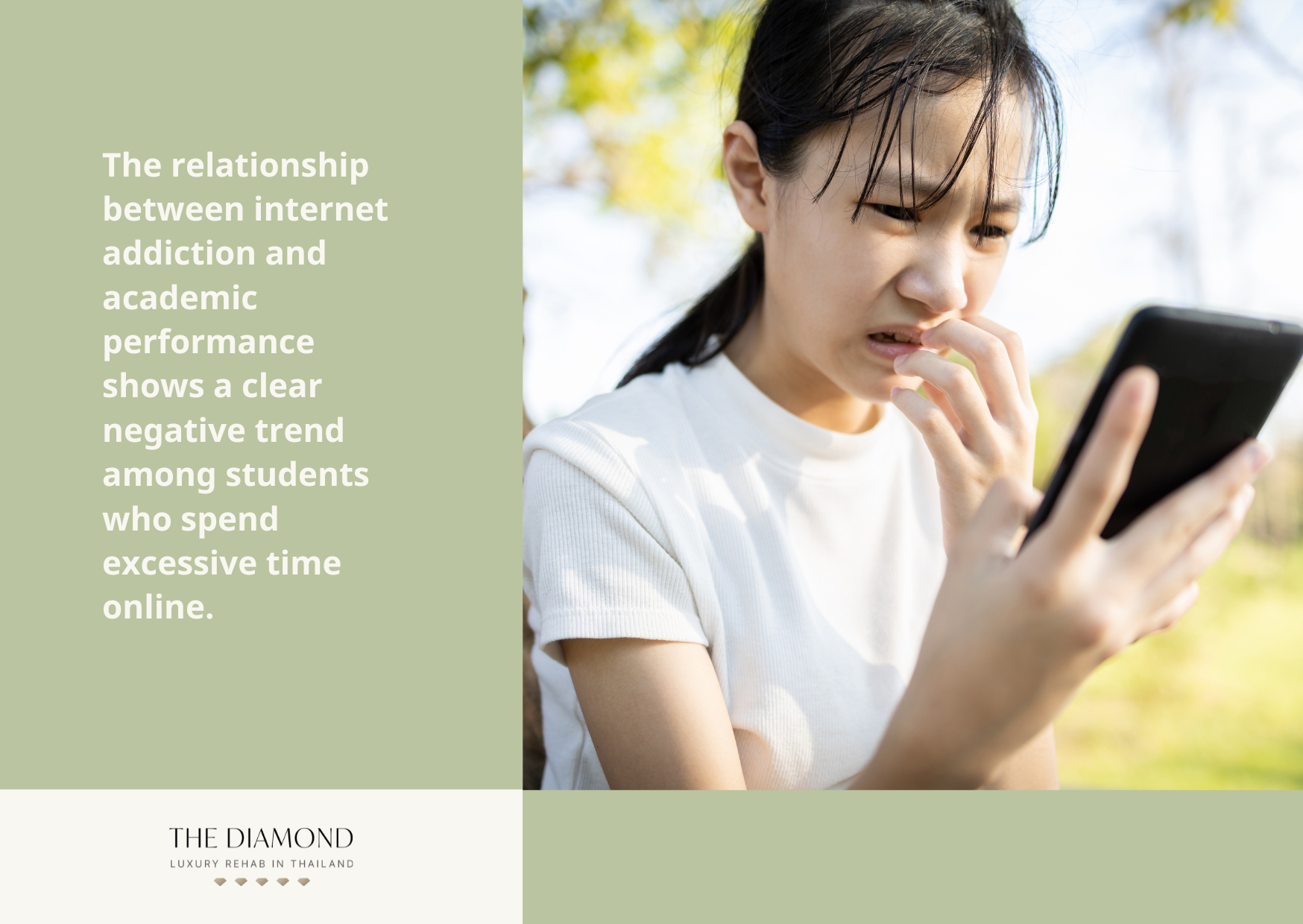
The relationship between internet addiction and academic performance shows a clear negative trend among students who spend excessive time online. Internet addicted individuals often prioritize online entertainment over schoolwork, reducing the time available for study.
Constant engagement with digital activities causes fatigue and reduces focus during lessons, hindering effective completion of assignments. Poor time management becomes common, as online use interferes with deadlines and scheduled study hours.
A 2020 study by Javaeed et al., titled “Relationship between internet addiction and academic performance of undergraduate medical students of Azad Kashmir” discovered a significant statistical correlation between internet addiction (IA) and subpar academic achievement. Exam scores were much lower for students with greater internet addiction (IA) scores; 131 (41.4%) students scored between 61% and 70%, while just 3 (0.9%) students scored above 80%.
Does too much internet use affect academic performance?
Yes, too much internet use affects academic performance because it takes focus away from critical learning tasks and makes students less interested in schoolwork. Students immersed in prolonged online activity often show diminished participation during lessons, leading to weaker comprehension of new material.
Disrupted sleep from late-night browsing impacts alertness, leaving less mental energy for classroom tasks. Sustaining academic success becomes challenging when screen habits interfere with consistent study habits.
A noticeable drop in motivation emerges as online entertainment provides faster rewards compared to the effort required for scholarly pursuits. Planning skills deteriorate, resulting in poorly prepared projects and missed opportunities for improvement.
What is internet addiction?
Internet addiction is a compulsive reliance on online activities interfering with daily responsibilities and well-being. Sometimes referred to as internet addiction disorder (IAD), pathological internet use or problematic internet use (PIU), the condition involves excessive time spent on social media, gaming or streaming at the expense of personal, academic, or professional priorities.
The unhealthy behavior develops when online engagement becomes the primary coping mechanism for boredom, loneliness or dissatisfaction. Individuals with IAD frequently neglect face-to-face relationships, preferring virtual interactions over real-world connections.
The compulsion to remain connected gradually reduces interest in hobbies and activities outside the digital environment. Left unaddressed, internet addiction erodes self-discipline and makes balanced technology use difficult to restore.
What is academic performance?
Academic performance pertains to the quantifiable results of a student’s academic endeavors assessed through grades, test scores and teacher evaluations. It is indicative of the level of achievement a learner attains in relation to established standards and curriculum objectives.
Consistent advancement in educational pursuits and mastery of necessary abilities are indicators of strong performance in school. Student achievement in such a context is influenced by factors such as study habits, classroom participation and the ability to apply learned concepts.
Maintaining success requires a lot of self-discipline, motivation and efficient use of time. Achievement at a high level frequently paves the way for further opportunities in one’s academic and professional goals.
What are the impacts of internet addiction on academic performance?
The impacts of internet addiction on academic performance are categorized as short- or long-term, influencing various aspects of a student’s learning and progress.
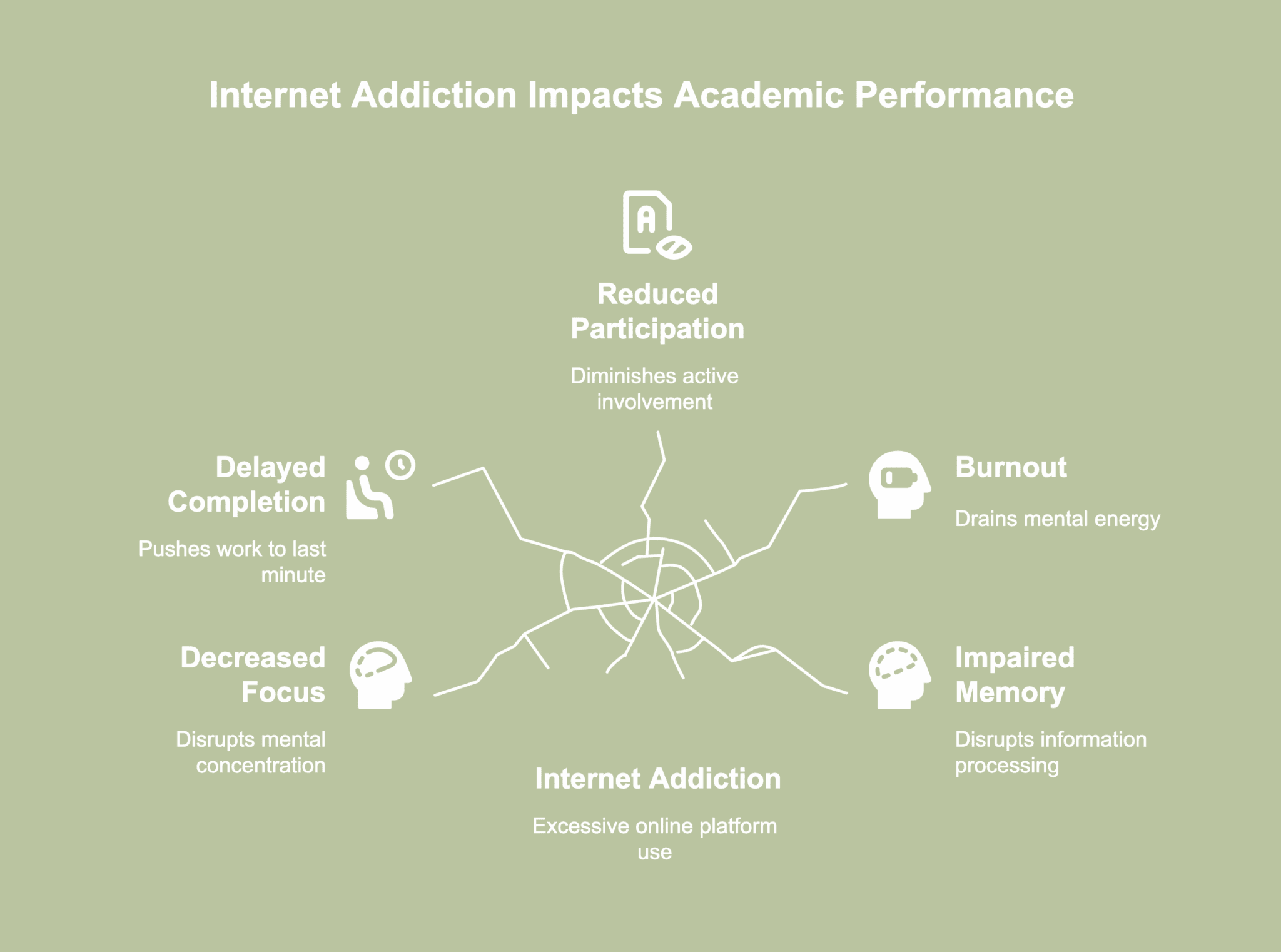
The short-term impacts of internet addiction on academic performance are listed below.
- Decreased focus: Excessive internet use disrupts mental concentration, causing students to lose track of lessons or study materials quickly. Distractions from social media notifications or online games break the flow of thought during learning. Loss of focus results in missed details and incomplete understanding of new topics.
- Delayed task completion: Heavy engagement with online platforms often pushes academic work to the last minute. As per a 2017 study by Azwa Ambad et al., titled “THE EFFECT OF INTERNET ADDICTION ON STUDENTS’ EMOTIONAL AND ACADEMIC PERFORMANCE,” internet-dependent students performed worse academically, most likely as a result of spending more time on non-educational activities like social media and gaming, which took away from study time and productivity.
- Reduced class participation: When online distractions dominate a student’s thoughts, active involvement in discussions diminishes. Learners hesitate to answer questions or share ideas due to fear of being unprepared. Lack of participation prevents valuable feedback from teachers and limits opportunities to practice communication skills essential for learning.
- Burnout: Constant exposure to stimulating online content drains mental energy, leaving little drive for school-related tasks. People experiencing burnout feel overwhelmed and disengaged. The exhaustion makes even simple study tasks seem difficult to start. As motivation declines, academic responsibilities suffer further neglect.
- Impaired short-term memory: Frequent switching between multiple online activities disrupts information processing. The brain struggles to retain details learned in class when overloaded with unrelated digital input. The interference causes individuals to forget instructions or key points quickly. Poor recall then affects performance on quizzes, assignments and in-class activities.
The long-term impacts of internet addiction on academic performance are listed below.
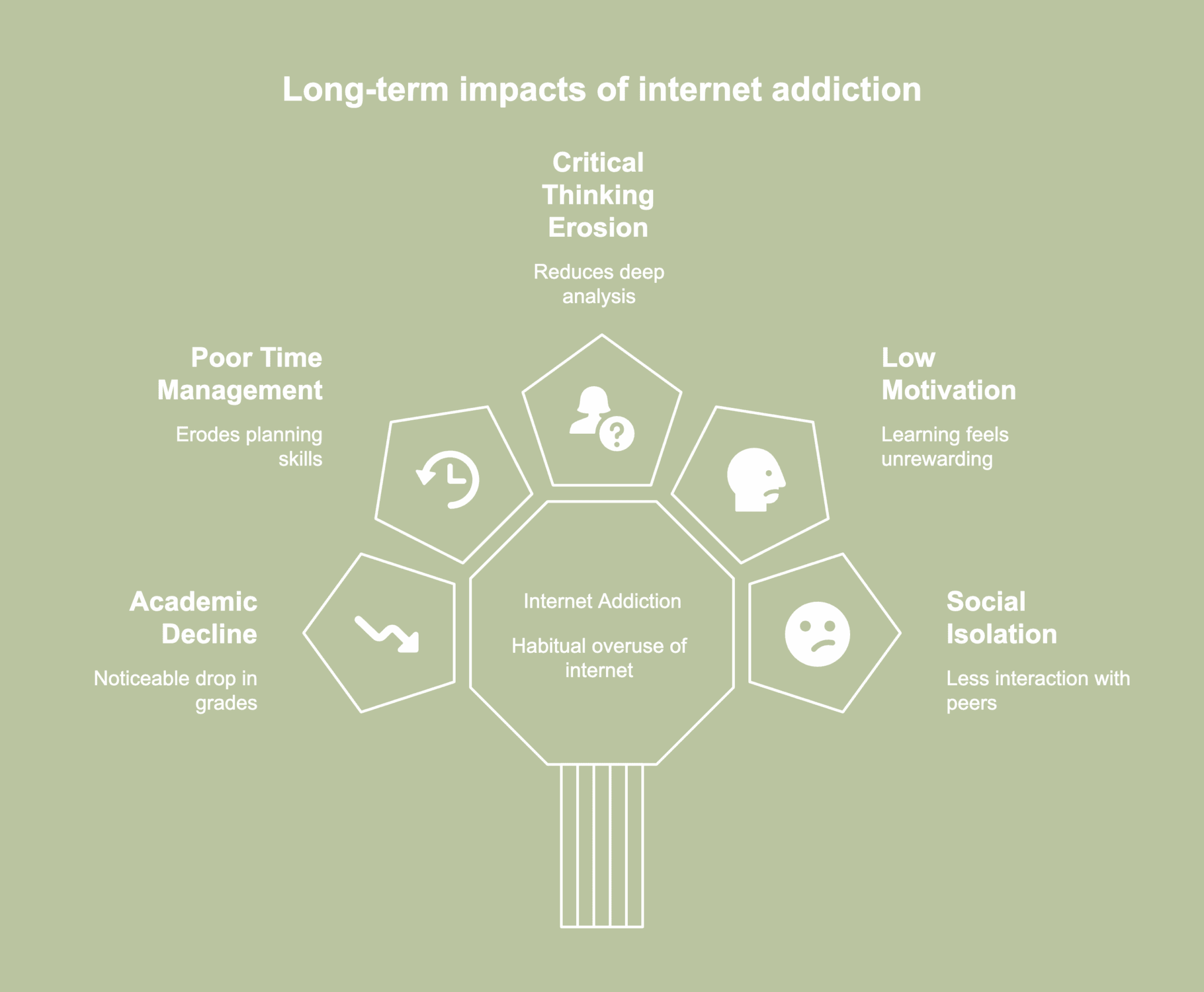
- Decline in academic achievement: Over months or years, habitual internet overuse leads to a noticeable drop in grades. Continuous neglect of studies weakens understanding of core subjects. Academic decline affects opportunities for scholarships or advanced learning tracks. Long-term academic standing suffers as a result.
- Chronic poor time management: Relying on impulsive browsing habits erodes planning skills over time. Students fail to allocate sufficient study periods or organize workloads efficiently. A statistically substantial negative connection was identified between nursing students’ internet addiction and overall time management in a 2024 paper by Ali et al., titled “Exploring the association between internet addiction and time management among undergraduate nursing students.” The findings indicate an increase in online addiction correlates with a decrease in time management skills, where elevated levels of internet addiction are linked to diminished time management capabilities.
- Erosion of critical thinking skills: Prolonged dependence on quick online answers reduces the effort put into deep analysis. Learners struggle to evaluate complex problems without instant digital guidance. Excessive reliance stunts intellectual growth and limits problem-solving abilities. Such deficits persist well beyond the school years.
- Persistent low motivation: Years of prioritizing online entertainment over schoolwork make learning feel unrewarding and create a strong link between internet addiction and mental health struggles. The instant gratification of digital media overshadows the delayed rewards of academic success. Students lose interest in pursuing challenging subjects.
- Social and academic isolation: Long-term internet addiction shifts attention away from collaborative learning and peer relationships. Individuals interact less with classmates, missing valuable opportunities for group learning. A 2021 study by Saadati et al., titled “Association between internet addiction and loneliness across the world: A meta-analysis and systematic review” revealed excessive internet usage exacerbates feelings of isolation, potentially as a result of a lack of face-to-face interactions or a reliance on virtual connections failing to satisfy social needs.
What are the early signs of internet addiction impacting academic performance?
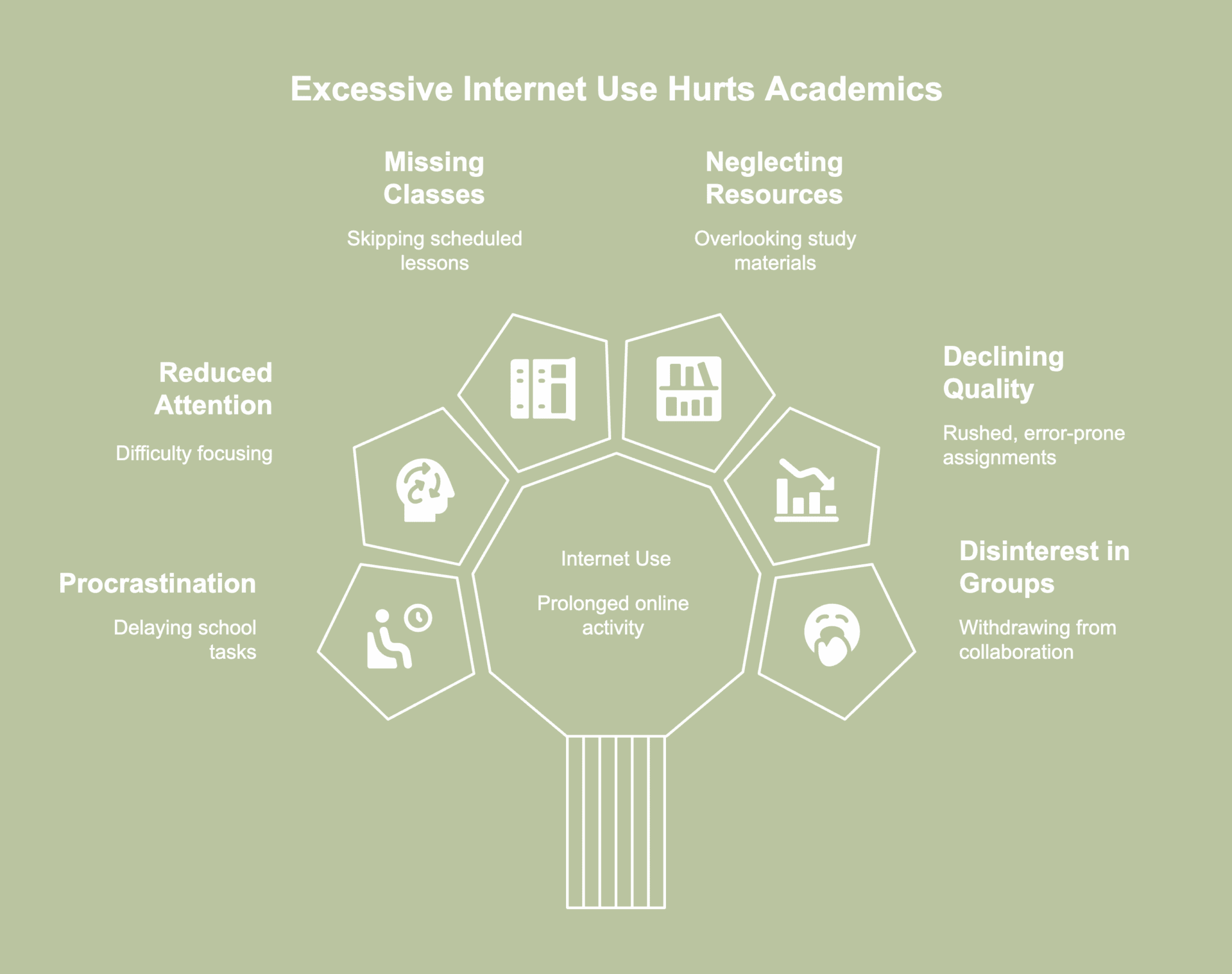
Early signs of internet addiction impacting academic performance refer to the initial indicators signaling excessive online activity is beginning to interfere with a student’s learning outcomes. The early signs of internet addiction impacting academic performance are listed below.
- Procrastination: Students increasingly delay starting school-related tasks due to prolonged internet use. Time meant for studying gets consumed by online entertainment or casual browsing. The habit creates unnecessary pressure as deadlines draw near, leading to rushed and subpar work. Persistent procrastination establishes a pattern often difficult to reverse once established.
- Reduced attention span: Constant switching between apps, videos and social media feeds trains the brain to expect rapid stimulation. In a classroom or study setting, sustaining focus on one topic becomes challenging. The capacity to ignore distractions and create irrelevant memory representations is diminished in heavy media multitaskers, according to a 2023 paper by Deren Bulut, titled “The Association between Attention Impairments and the Internet and Social Media Usage among Adolescents and Young Adults with Potential Consequences: A Review of Literature.” Social media sites intentionally make the situation worse by inducing involuntary attention changes with pop-ups and notifications.
- Missing classes: A growing preference for online activities leads students to skip scheduled lessons altogether. Time spent gaming, streaming or chatting online replaces the structured environment of the classroom. Such absence causes missed explanations, instructions and collaborative opportunities. As gaps in knowledge widen, catching up becomes increasingly difficult.
- Neglect of academic resources: Students begin to overlook textbooks, research materials or school-provided study tools in favor of quick online sources. Reliance on minimal-effort information reduces exposure to in-depth explanations and critical thinking exercises. As a result, the ability to analyze and synthesize information weakens. Neglect of academic resources undermines academic progress over an extended period.
- Declining quality of written work: Assignments become less detailed and more prone to errors as internet-related distractions consume planning and drafting time. Students often rush through writing tasks to return to online activities. Poor organization and lack of revision become more common as well. A steady decline in one’s quality of work reflects the impact of divided attention on academic output.
- Disinterest in group study: Students showing early signs of problematic internet use tend to withdraw from collaborative learning settings. Affected individuals view group work as less appealing than solitary online engagement. Limited participation reduces opportunities to exchange ideas and gain valuable feedback from peers. Reduced participation in group study eventually hinders communication skills and cooperative problem-solving abilities.
How common is internet addiction in students?
Internet addiction in students is common, with a global pooled prevalence among medical students estimated at 29%, according to a 2024 study by Salypnov et al., titled “The Worldwide Prevalence of Internet Addiction among Medical Students: A Systematic Review and Meta-Analysis.” This indicates approximately one in three medical students worldwide is addicted to the internet.
A 2023 publication from the Office of the Surgeon General, titled “Social Media and Youth Mental Health” revealed that according to a Monitoring the Future survey of 8th and 10th graders, the average amount of time spent on social media is 3.5 hours per day; one in four spend more than five hours per day, and one in seven spend more than seven hours per day, indicating possible problematic use.
What are the causes of student internet addiction?

Causes of student internet addiction refer to the underlying factors driving learners to develop an excessive reliance on online activities. The causes of student internet addiction are listed below.
- Escapism from personal problems: Students often turn to the internet as a way to distance from difficulties at home or in personal life. Online platforms provide a temporary sense of relief by distracting from stressful emotions. Overreliance on digital escape fosters avoidance rather than healthy coping strategies. With time, dependence deepens, and the online world becomes the main source of comfort.
- Desire for recognition: The search for validation through likes, comments or shares drives excessive social media engagement. Positive feedback online creates a sense of importance and brings a rewarding feeling. The constant craving for recognition pushes students to remain connected, even during times reserved for studying.
- Lack of parental or teacher guidance: When supervision is limited, students spend long hours online without restrictions. Without adults setting clear boundaries, digital activity takes priority over schoolwork. Missing rules or accountability encourages unhealthy routines. According to a 2023 study by Chemnad et al., titled “Adolescents’ Internet addiction: Does it all begin with their environment?,” poor family ties (low cohesion, high conflict) greatly predict higher IA and symptoms, consistent with the escape-from-self theory, where teenagers use the internet to cope with distress. Positive teacher support’s surprising positive correlation with IA reflects focused support for at-risk children.
- Competitive online gaming culture: Intense gaming environments promote constant participation to stay ahead of peers. The desire to achieve higher rankings or maintain progress keeps students logged in for extended periods. Such competition feels thrilling, but gradually overshadows interest in real-world goals. As gaming dominates, focus on education steadily declines.
- Unstructured daily routine: Students without organized schedules often struggle to balance internet use with study requirements. Empty time slots become filled with casual browsing, streaming or chatting. The absence of structure allows hours online to stretch uncontrollably. Long-term exposure to unstructured routines fosters dependency and limits productivity.
How much internet is considered excessive for students?
There is no single universally accepted limit for how much internet use becomes excessive for students, as recommendations vary across studies and health organizations. For instance, findings of a study by Anand et al., titled “Prevalence of excessive internet use and its association with psychological distress among university students in South India” published in 2018 suggested university students who used the internet for non-academic purposes for more than three hours a day had greater levels of internet addiction.
Most guidelines suggest about two hours of recreational internet use per day is a reasonable limit for students, aligning with widely accepted screen time recommendations. However, a 2018 study by Berchtold et al., titled “Daily internet time: towards an evidence-based recommendation?” presented a different perspective, challenging the idea of two hours being the safe threshold.
The report demonstrated the lack of rationale for limiting screen use to just two hours each day. Significant health effects seemed to manifest after four hours a day. In particular, youths who spent 3.5 to 4.5 hours a day on the internet showed negative health consequences related to sleep issues, nicotine use, alcohol abuse, cannabis use and lack of participation in sports. The study additionally noted possible benefits for adolescents who spend less than an hour and a half on the internet.
What are the online activities of students that lead to internet addiction?

Online activities of students that lead to internet addiction refer to the digital behaviors and habits gradually fostering dependency on constant internet use. The online activities of students that lead to internet addiction are listed below.
- Endless scrolling on social feeds: Students often lose track of time while scrolling through platforms filled with updates, photos and videos. The continuous stream of new content encourages prolonged engagement, as the next post always promises fresh stimulation. The habit creates a cycle where logging off feels increasingly difficult.
- Streaming series or videos: Binge-watching multiple episodes or long video playlists easily turns into hours spent in front of a screen. The autoplay feature on streaming sites removes natural stopping points, encouraging continued viewing. The activity draws attention away from study schedules and academic responsibilities. With preferences for mukbang (eating broadcasts), short-form videos (like the ones on TikTok), pornography, and entertainment (such as dramas and variety shows), video content is what keeps people watching, as noted in a 2021 article by Yang et al., titled “Can Watching Online Videos Be Addictive? A Qualitative Exploration of Online Video Watching among Chinese Young Adults.” Pornography meets sexual needs, short videos give rapid dopamine boosts, and mukbang satisfies vicarious eating.
- Online shopping: Visiting e-commerce sites to shop for clothes, accessories or gadgets easily causes individuals to lose track of time. The multitude of products and promotions keep students coming back to browse more, even when purchased items are often unnecessary. Aside from problematic internet use, financial problems are one of the biggest risks associated with online shopping.
- Content creation platforms: Nowadays, certain individuals take content creation as a full-time job. The activity entails posting photos, writing posts or reviews and producing videos—tasks demanding significant time investment. When younger people like students start to create content, the desire to maintain an online presence pushes them to devote more time for the activity, even time supposedly allotted for studying.
- Internet gaming: Competitive and immersive games draw learners into extended play sessions lasting far longer than intended. The reward systems, achievements and fast-paced environments create a strong pull to keep returning. Academic duties become secondary as energy and attention are directed toward in-game progress.
How do you overcome internet addiction to improve academic performance?
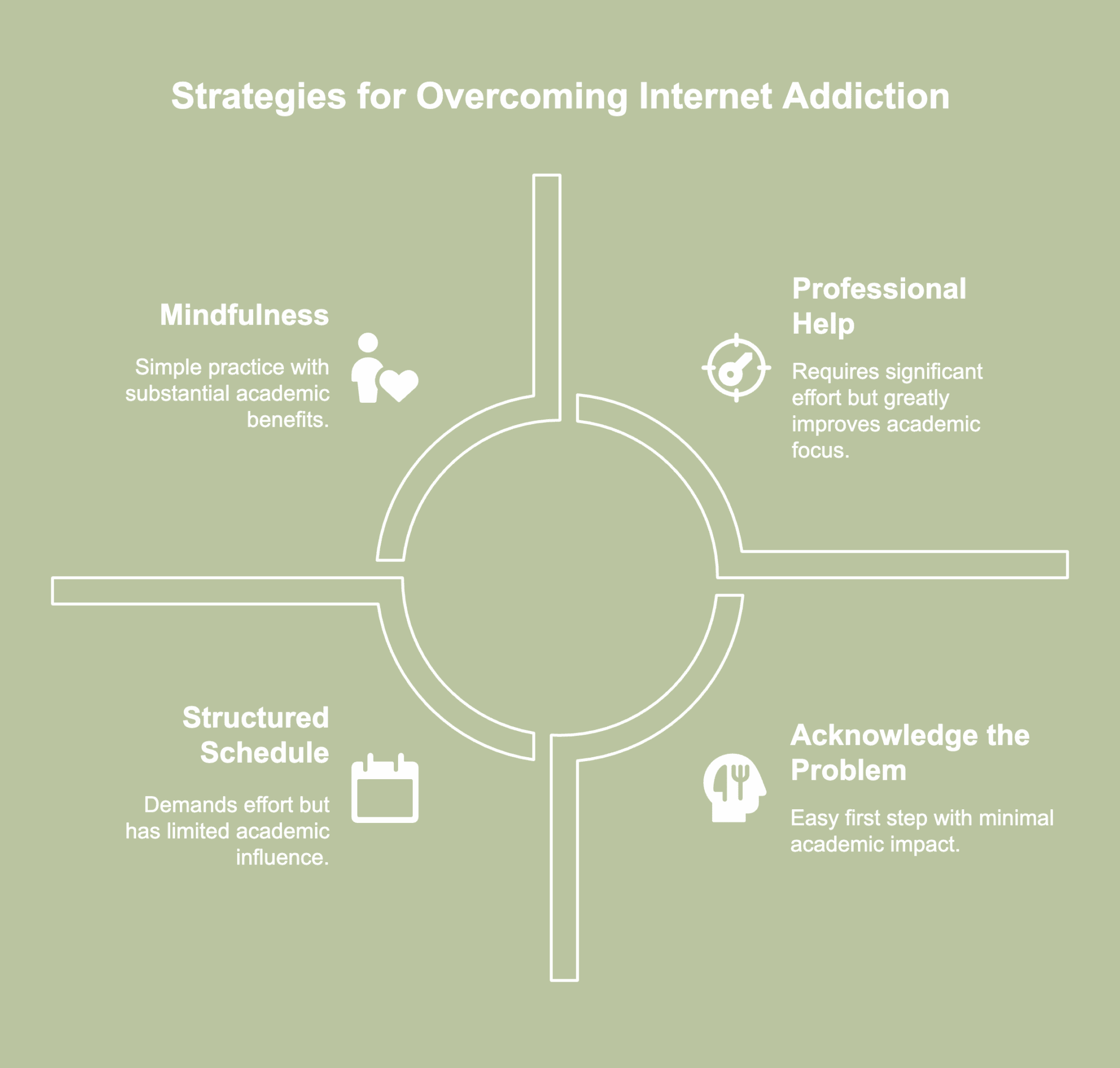
Ways to overcome internet addiction to improve academic performance describe doable methods meant to help students regain focus on learning over unhealthy internet usage. The ways to overcome internet addiction to improve academic performance are listed below.
- Acknowledge the problem: The first step toward overcoming internet addiction involves honestly recognizing how the behavior interferes with academic responsibilities. Students who accept the reality of the situation often feel more motivated to take action, since denial no longer prevents change. Admitting the problem helps shift attention from avoidance to practical solutions restoring balance.
- Set study priorities: Placing academics at the center of daily planning helps reduce distractions caused by unnecessary online use. When a clear list of tasks is created, students gain direction and feel less tempted to wander online aimlessly. The approach keeps learning goals visible, strengthening accountability.
- Create a structured schedule: Organizing the day with specific times for study and leisure encourages a healthier balance between responsibilities and relaxation. A fixed routine prevents excessive time from being lost to online browsing, since each activity already has a place. Structure builds discipline while reducing the stress of uncertainty about what to do next.
- Practice mindfulness: Mindfulness offers a way to regain control over impulsive online habits by encouraging individuals to remain present in the moment. Techniques like meditation, deep breathing or simply pausing to reflect before opening a device help reduce the urge to go online without purpose. In order to address IA, mindfulness-based therapies (MBIs) such as Mindfulness-Based Stress Reduction (MBSR) and Mindfulness-Based Cognitive Therapy (MBCT) enhance executive functioning, impulse control and emotional regulation, according to a 2024 paper by Samanta et al., titled “Mindfulness as a Path to Freedom from Internet Addiction in Adolescents: A Narrative Review.”
- Engage in offline hobbies: Exploring interests away from the screen provides a healthy outlet for energy and creativity. Activities like painting or playing music redirect attention from constant internet use to meaningful real-world engagement. Having such outlets builds confidence and personal fulfilment, lessening the urge to overuse technology.
- Identify triggers: Understanding the personal factors driving excessive internet use allows affected learners to address the root of the behavior rather than just the outcome. Triggers typically include stress from academics, feelings of isolation or even moments of boredom pushing students online for comfort. Once familiar patterns are recognized, healthier alternatives—such as engaging in hobbies or taking physical breaks—become easier to apply.
- Consider professional help: In cases where personal strategies are not enough, turning to professional support provides structured guidance and coping tools. Seeking help from an expert removes the sense of facing the problem alone and brings steady encouragement instead. Professional intervention helps overcome internet addiction and improves overall emotional wellbeing.
Is monitoring usage effective in reducing internet addiction?
Yes, monitoring usage is effective in reducing internet addiction, though the outcome depends on how the method is applied. Monitoring internet usage increases awareness and enables students to identify detrimental patterns frequently overlooked.
Once patterns are clear, setting boundaries becomes easier because a concrete understanding of how much time is being lost develops. Monitoring helps pinpoint specific online activities consuming excessive hours, making the root of the problem easier to address instead of just focusing on the habit itself.
A greater sense of accountability for one’s decisions is made possible by the practice. Through gaining valuable information into behavioral trends, schools and families are able to step in when necessary.
However, monitoring alone is not always enough for lasting change, as certain students grow more secretive about online habits once awareness of being tracked sets in. Furthermore, monitoring shifts focus onto the numbers rather than addressing emotional or psychological triggers.
On its own, the approach risks treating the symptom instead of the underlying cause. Greater success usually comes when tracking is paired with education or counselling, as these methods teach healthier habits and provide emotional support alongside structured oversight.


